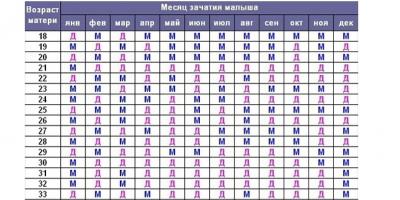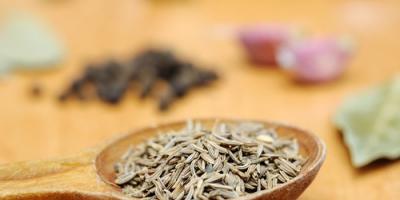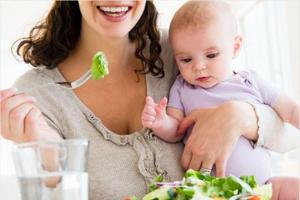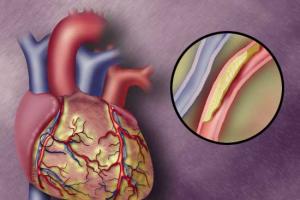The menu of a nursing mother is the subject of close attention of all household members. The health of the baby, its growth and development depends on the full composition of the dishes. In addition, his peaceful sleep depends on the right choice of products. Any inappropriate component turns into colic, flatulence and night vigil of adults over the baby. What can a breastfeeding mother eat? What dishes, foods and drinks do mothers need, and what should be temporarily abandoned?
![]()
For the full composition of milk, a mother should receive proteins, fats, carbohydrates, trace elements, vitamins, enzymes with food. The daily diet of a nursing mother should consist of 20% protein, 60% carbohydrates and 15% fat. In addition, a nursing mother needs a sufficient amount of fluid. The first six months of feeding produces the maximum amount of milk - up to 1 liter per day.
Meals for nursing mothers should cover the need for liquid food and supply the required amount of substances.

The basis of nutrition is cereal soups and sour-milk products. They provide the necessary carbohydrates and proteins, fluid and bacteria for the digestion of food. It is the bacterial composition that determines the digestibility of products, which means their amount in the composition of breast milk.
In addition, dairy products supply calcium, which is necessary for the growth of the baby's bones and its ligamentous apparatus. If calcium is not supplied with food in sufficient quantities (or is poorly absorbed), then the bones and teeth of the mother become the source of calcium.
List of foods for breastfeeding mothers
- 200 g animal protein (meat or fish);
- 150-200 g of cottage cheese or cheese;
- 1 liter of fermented milk products (ryazhenka, whey, kefir or homemade yogurt);
- 1-2 eggs.
Meat for a nursing mother should be lean and boiled (steamed). In the first month of life, the intestines of the child are colonized by bacteria. Therefore, it is possible that their number will be insufficient for the digestion of foreign protein (animal meat). Then allergic manifestations (rashes) and indigestion (bloating and colic) are possible. Do not eat meat during the first days after childbirth, and then introduce it into the diet little by little. In order for the baby's body to quickly adapt to new food, give him probiotics - preparations with bifidus and lactobacilli.
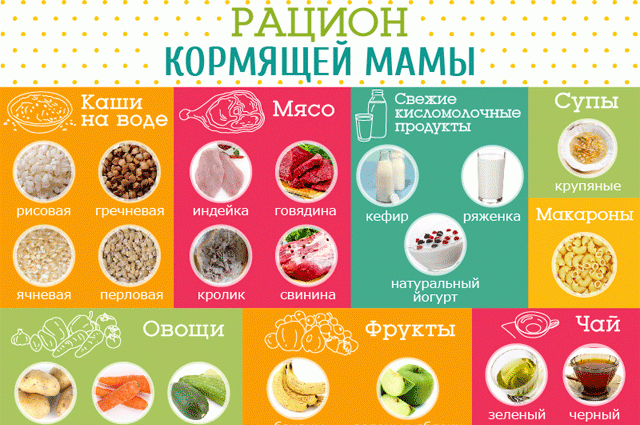
Mushrooms are a special kind of food. It is a vegetable protein that is digested faster and better than animal meat. However, you can use mushrooms when breastfeeding after the first month of a baby's life, and only those that have grown in a clean garden. The fact is that the fungus is a nurse plant. It absorbs all the poisons around (herbicides, environmental pollution, car emissions). Therefore, even an edible mushroom can be poisonous, and for crumbs it can be fatal.
Nuts are considered an easily digestible protein. A nursing mother can eat raw and roasted nuts in the first month of a baby's life. They supply not only protein, but also vegetable fat, trace elements and vitamins. This increases the nutritional value of milk without allergic reactions.
Is it possible for a nursing mother to have seeds? Seeds, like nuts, are a fast-digesting vegetable protein. Therefore, it is not only possible to eat them, but also necessary. Important: seeds should not contain sweeteners, coloring additives and other "chemical components". It is they who cause an allergic reaction in the baby in the form of a rash, redness, peeling.
Milk and dairy products are the main source of bifidus and lactobacilli. The baby can be given probiotics (concentrated bacteria in a dormant form). And mother should definitely eat cottage cheese, drink fermented baked milk, kefir, whey, as well as tea with milk. Do not eat condensed milk, this product contains sugar and preservatives. Therefore, in most children, condensed milk in mother's milk causes an allergic rash.
Carbohydrates are the basis of the diet
Carbohydrates are the basis of the diet of a nursing mother. Carbohydrates are included in grain products (cereals, soups, bread), vegetables and fruits. Cereals and soups are prepared from cereals.
Soups for nursing mothers are cooked on the basis of low-fat broth (poultry meat). During the first week of life, soups for mothers are boiled in water. After that, broths are introduced into the diet and possible allergic reactions in the baby are observed. If they are not there, the amount of broth on the menu is increased, or they switch to beef broth and add meat.
In the first month, you should not eat baking and confectionery. All kinds of baking powder, palm oil and flavorings are not needed by your baby, they cause allergic rashes and anxiety. Eat ordinary bread and any cereals.
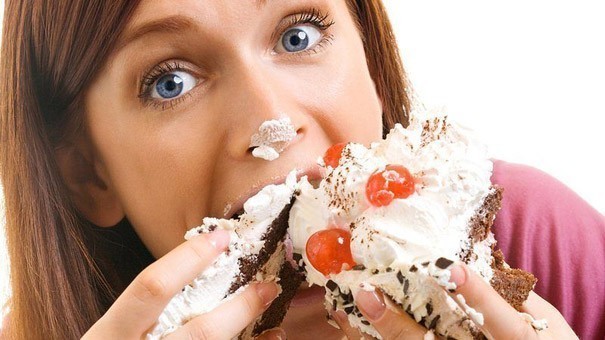
Vegetables and fruits are a source of vitamins
Vegetables and fruits are the main suppliers of fiber, vitamins, enzymes for digesting food. Fiber ensures the movement of feces through the intestines. It absorbs toxic substances and cleanses the digestive tract. But often fruits and vegetables cause gas and nighttime colic in babies. How to be? Can I include vegetables and fruits in my mother's diet while breastfeeding?
The diet of a nursing mother may include raw vegetables and fruits, but they must be introduced into the diet in small portions. 1-2 weeks after giving birth, try adding an apple slice or a spoonful of coleslaw to the menu. If your baby is responding well and there is no colic or rash, increase the portion of the vegetable meal (slowly).
If his digestion cannot cope with vegetable or fruit components, exclude them from the diet for a while.
What can a nursing mother eat in the first month of a baby's life? During the first days and weeks, you can fearlessly eat baked vegetables. They retain a full range of nutrients, trace elements and contain fewer active vitamins and enzymes. Therefore, they do not cause gas formation in the intestines.
apples or bananas
The traditional question whether it is possible for a nursing mother to eat bananas, apples or other fruits does not have a clear answer. It's very individual. It is possible that for most children, bananas do not cause an allergic reaction, and your baby will react badly. Or, on the contrary, everyone has a tummy ache after apples, and you can safely consume this fruit.
Is it possible for a nursing mother to eat apples - it depends on two factors: the variety of the apple and how many apples the mother ate before pregnancy. This fruit contains pectin and fiber, which cleanse the intestines. If you didn't eat enough fruits and vegetables before giving birth, there are fecal deposits on the walls of your intestines.
Pectin actively dissolves them, and fiber stimulates their excretion. Good for you, bad for the baby. Your body is cleared of toxins, while they enter the bloodstream, milk and cause colic and flatulence in the baby.
Such cleaning during feeding is not the best way to improve.

Peas and cabbage act in a similar way. They dissolve existing feces and cause gas in the mother. At the same time, similar processes occur in the digestion of the child. Gases are formed, which cause pain and disturb sleep.
You can prevent gas formation when eating apples by adding baked apples to the menu. Heat treatment removes some of the biologically active substances, so baked apples do not cause bloating and gas formation in the intestines.
Carminatives (chamomile or dill tincture in a weak hypotonic form) also help to cope with flatulence in a baby. They help the baby to remove gas and "fart" without pain.
Overseas fruits and dried fruits
Is it possible for a nursing mother persimmons and oranges? These fruits do not grow in our regions, therefore they are not a staple food. If you did not often eat persimmons during pregnancy, you should not experiment with breastfeeding. Persimmon and citrus fruits (oranges, tangerines) are a frequent allergen, and not only due to the natural dye, but also due to the presence of preservative residues in them, which are used to process the fruit peel during transportation and long-term storage.

Also, be wary of dried fruits that are too beautiful and fragrant. Their external attractiveness speaks of a preliminary processing process (soaking in sugar syrup, impregnating with preservative additives). This applies to soft and tasty dried apricots, raisins, dates. Without fear, you can eat home-made dried fruits - dried apples, pears, plums.
The best fruits and vegetables to eat are those that grow in the region where you live.
Let's list what fruits a nursing mother can eat (the list given is indicative, you need to eat any fruits little by little and look at your baby's reaction):
- Baked apples - from the first days of life. Raw apples - in the absence of colic in the baby.
- Pears - in the absence of a tendency to colic.
- Home-grown melons and watermelons (they should not contain fertilizers and nitrates).
- From overseas fruits - bananas.
- Grapes (weakens the intestines), sometimes plums (also weaken).
- Citrus fruits (except lemon).
- Other overseas fruits: mango, kiwi, persimmon are also not recommended.
Artificial vitamins and precautions
If your child does not respond well to raw fruits and vegetables, artificial vitamins should be taken.
Important: you need to choose their composition so as not to cause an allergic reaction in the baby.
Often advertised Multitabs cause too obvious allergies, and domestic Undevit is perfectly absorbed without rashes and redness.
The diet for nursing mothers excludes a number of products from the nutrition menu:
- All products that contain preservatives and dyes: sausages, canned food, processed cheeses, mayonnaises and ketchups, fast foods and McDonald's. Read what is written in the composition of the products on the packaging. And if, in addition to a clear list, you see the designations of chemicals, feel free to leave the “product” on the store shelf. Neither you nor your baby needs it.
- Confectionery sweets: cakes, ice cream, sweet pastries. Firstly, they contain a lot of sugar and indigestible confectionery fat, palm oil. Secondly, various flavor enhancers and baking powder are added to most confectionery and pastries. Do not experiment with your baby's immune system. Food additives are one of the main causes of allergies in modern children.
- Chocolate (cocoa) and products containing it. In most cases, the baby is not digested and therefore causes a rash and redness.
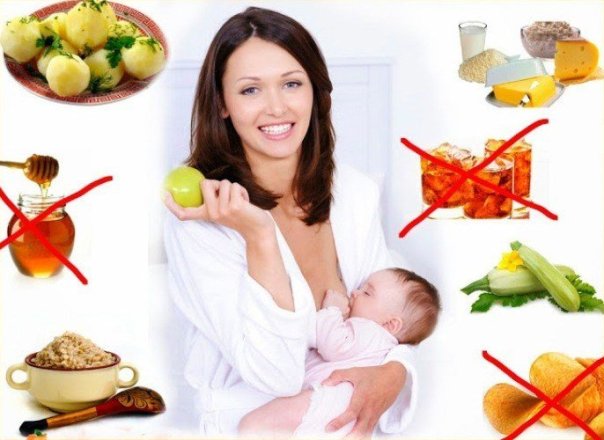
The younger the child, the more restrictions are placed on the nutritional diversity of the breastfeeding mother. Every month, the child's digestion is replenished with new enzymes and bacteria, so many allergic reactions go away on their own.
Drinks: is it possible for breastfeeding mothers to have coffee
A number of drinks, widely consumed by women and men of a civilized society, are not useful at all. For example, coffee is a natural stimulant. At first, it activates the psyche, after that it causes weakness. In addition, the coenzyme is a diuretic, that is, it stimulates the outflow of fluid from the tissues. It is unlikely that this effect is necessary for the health of your baby.

What else should not drink a nursing mother:
- Hot (or hard) chocolate, cappuccino, mocaccino and other "drinks" from the "3 in 1" series. They contain a sweetener and powdered milk, food additives that cause allergic reactions in babies.
- Kvass - despite the naturalness of the product, it contains too many yeast bacteria, therefore it disrupts the formation of bacterial flora in the intestines.
- Drinks with gases: soda, soda, cola. In addition to the effect of gas formation in the intestines, they contain dyes and preservatives.
- Juice in boxes - in fact, is not juice. At best, it is an apple juice concentrate with sugar syrup and chemical additives (flavor enhancer, coloring pigment, preservative). At worst - a composition of chemical additives based on water.
What can a nursing mother drink:
- compote from homemade fruits and dried fruits;
- weak tea with milk;
- natural fermented milk drinks: fermented baked milk, kefir, whey.
Menu for a nursing mother in the first month
The nutrition of a nursing mother in the first month requires special attention. The digestion of a newborn child is only getting better, the intestines are populated with enzymes and bacteria, so many products in the composition of mother's milk may not be digested, causing frustration and colic.
Do you want something interesting?
What to eat for a nursing mother in the first month (daily rate):
- fermented milk drinks - 1 l;
- cottage cheese and cheese - 200 g;
- butter 20-30 g;
- animal protein (meat or fish) - 150 g;
- cereals (as part of cereals and soups) - 300 g;
- baked fruits - up to 300 g;
- baked or stewed vegetables - up to 600 g;
- drinks (tea, compote) - up to 2 liters.
Recipes for nursing mothers
Here are some healthy dishes that can be prepared for a nursing mother even in the first month of a baby's life.
Porridge with butter or sour cream
Whole grain cereals are easy to prepare. They do not need to be stirred, stand near them and make sure that they do not burn. To prepare whole porridge, you need to rinse the cereal, pour it with water in a ratio of 1: 3 and put on fire. You can salt immediately or when it boils.
After boiling, the fire must be reduced and wait until the porridge "reaches" to readiness. When there is almost no water left in the pan, turn off the fire, remove the pan from the stove and cover it with a thick cloth (pillow, old woolen jacket) on top. So in the heat, the porridge completely absorbs the water and does not burn.
Put on a plate, add natural butter (not margarine) or sour cream.
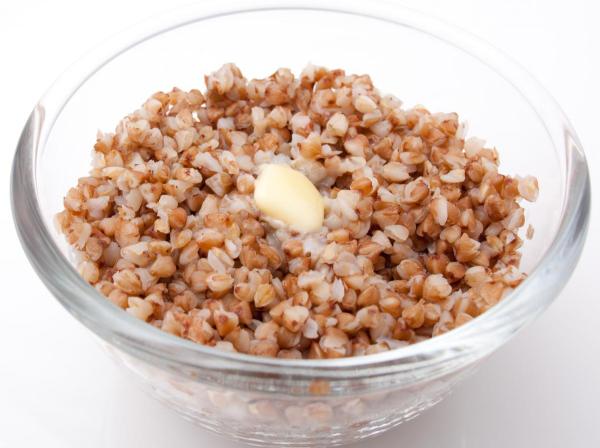
Potato baked with cheese
The potatoes are washed and baked in the oven. After peeling, cut into 2-4 parts and placed on a baking sheet. Place shredded or grated cheese on top. Heat in the oven for 5-10 minutes to melt the cheese.
Potato food is a solid food, it is advisable to drink it with a fermented milk drink (ryazhenka or yogurt).
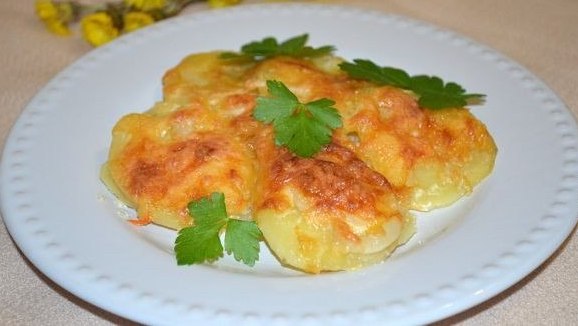
On a note: if you produce a little milk, then cook yourself a hearty dinner. The amount of milk is enough until the morning feeding, you and your baby can sleep peacefully.
Prepared from cottage cheese (500 g), eggs (1-2 pieces), a small amount of sugar (1 tablespoon) and oatmeal. In the first month of a baby's life, semolina is not put in a casserole for mom. Instead of semolina, use oatmeal. How are they prepared?
Cottage cheese is rubbed with eggs and sugar, then flakes are added and allowed to stand for 30-40 minutes (so that the flakes swell). Then spread in a pan or mold and baked in the oven at 150-180ºC for a little less than an hour. Keep in the oven after baking for another 10 minutes. They take it out and cool it down.

Breastfeeding mom's menu by month
Every day the baby becomes more mature, his digestion is getting better. At the same time, the number of restrictions is reduced, the product menu is expanding. With the advent of complementary foods, the baby's diet is enriched with fruits and vegetables.
The table below clearly demonstrates how the mother's diet expands with each month the baby grows up. Using the table, you can determine whether it is possible for a nursing mother to eat one or another product.
Nutrition table for a nursing mother by month:
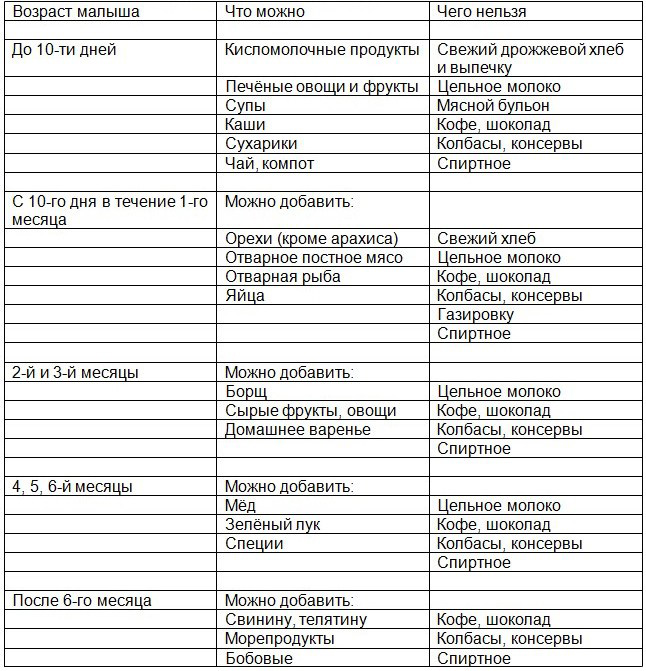
Be sure to remember: every new product is introduced little by little.
I am a mother myself. The question of my nutrition and the nutrition of my son worried me very much. I liked that there are examples of foods that you can and cannot eat. On many sites, the information is very ambiguous. The article also lists the benefits of nuts, but I would not recommend eating them in large quantities, as this can cause constipation.
The diet of a nursing mother is the basis of a child's health. All the substances that the mother has consumed end up in milk, and your baby drinks it. You must be very careful about your diet if you do not want your child to have a problem with the tummy or diathesis. I watched what I eat, down to the smallest detail, down to what kind of apples you can - only green, and by no means red (!!!), and just a little bit. It is in our hands to make your child happy, healthy and cheerful! I wish a lot of patience to all mothers!
What can and can not breastfeeding mothers?
The answer to this question is on the site!
Drawing up individual programs of weight correction.
Call now for a free consultation -
+7 (499) 677-66-94 (Moscow)
8-800-250-40-34 (Call within Russia is free)
Go to - PROPERE.RUSvetlana Vetryakova
The menu for a nursing mother should contain healthy, low-calorie foods, so that later you do not have to urgently lose weight under your usual jeans. After the first birth, I almost immediately returned to my usual weight, but after the second, it spread out by 6 kilograms. She herself ate with the baby low-fat broths, cereals and mashed potatoes, all boiled, stewed. Sour-milk products almost daily, so that milk arrives for the benefit of the intestines. I began to cook kefir, cottage cheese, I really liked the “Bakzdrav” starter cultures, after six months I prepared mixtures with bananas and all kinds of fruits for the baby.
I didn’t follow the food at all during the guards and gained a lot of excess, I took up myself only after the end of the guards. A slender mother drank Modelform for two months and returned to shape, I started eating less, finally I look great, even my hair has recovered

